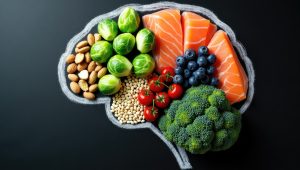
by Amy Mullins, PhD, RDN | Aug 1, 2025

Good nutrition is important to cognitive function. (Adobe Stock Image)
The Connection Between Nutrition and Memory: How Food Affects Cognitive Function
Memory is a complex and multifaceted cognitive function that plays a vital role in our daily lives. From remembering important events and appointments to recalling learned skills and knowledge, memory is essential for our overall well-being and success. While genetics and lifestyle factors can influence memory, a growing body of research suggests that nutrition also plays a significant role in cognitive function and memory.
The Importance of Nutrition for Memory
A well-balanced diet that includes a variety of whole foods, such as fruits, vegetables, whole grains, lean proteins, and healthy fats, provides the necessary nutrients and building blocks for optimal brain function. The brain is a hungry organ, accounting for approximately 20% of the body’s total energy expenditure. Adequate nutrition is essential for maintaining healthy brain cells, facilitating communication between neurons, and supporting the growth and development of new neural connections.
Key Nutrients for Memory
Several nutrients have been identified as essential for supporting memory and cognitive function. These include:
- Omega-3 fatty acids: These healthy fats, particularly EPA and DHA, are found in fatty fish, nuts, and seeds. Omega-3s support brain cell membrane structure and function, promoting healthy communication between neurons.
- Vitamin D: This essential vitamin is obtained through sun exposure, dietary sources, and supplements. Vitamin D receptors are found in brain cells, and research suggests that vitamin D plays a role in regulating neurotransmitter function and protecting against age-related cognitive decline.
- B Vitamins: B vitamins, particularly B6, B9 (folate), and B12, are essential for synthesizing neurotransmitters and maintaining healthy brain cells. Foods rich in B vitamins include leafy greens, legumes, whole grains, and lean meats.
- Antioxidants: Antioxidants, such as vitamins C and E, and polyphenols found in fruits, vegetables, and tea, help protect brain cells from oxidative stress and inflammation, which can damage memory and cognitive function.
- Magnesium: This essential mineral supports neuronal function and synaptic plasticity, facilitating learning and memory. Foods rich in magnesium include dark leafy greens, nuts, and whole grains.
Dietary Patterns Associated with Better Memory
Research has identified several dietary patterns that are associated with improved memory and cognitive function. These include:
- Mediterranean diet: Characterized by high intake of fruits, vegetables, whole grains, lean proteins, and healthy fats, the Mediterranean diet has been shown to support cognitive function and reduce the risk of age-related cognitive decline.
- DASH diet: The DASH (Dietary Approaches to Stop Hypertension) diet, developed to reduce blood pressure, emphasizes whole grains, fruits, vegetables, lean proteins, and low-fat dairy products.
- Plant-based diet: A diet rich in plant-based foods, including fruits, vegetables, legumes, and whole grains, has been associated with improved cognitive function and a reduced risk of age-related cognitive decline.
Tips for Supporting Memory through Nutrition
- Eat a balanced diet: Focus on whole, unprocessed foods, including fruits, vegetables, whole grains, lean proteins, and healthy fats.
- Stay hydrated: Adequate hydration is essential for maintaining cognitive function and supporting memory.
- Limit processed and sugary foods: These foods can lead to inflammation and oxidative stress, which can damage brain cells and impair memory.
- Consider supplements: If you’re concerned about getting enough nutrients through diet alone, consider consulting with a healthcare professional about supplementing with omega-3s, vitamin D, and other essential nutrients.
Conclusion
While genetics and lifestyle factors can influence memory, nutrition plays a critical role in supporting cognitive function and memory. By incorporating a balanced diet rich in whole foods, essential nutrients, and healthy fats, you can support optimal brain function and reduce the risk of age-related cognitive decline.
References:
During the preparation of this work the author used the AI tool, NaviGator. After using this tool/service, the author reviewed and edited the content as needed and takes full responsibility for the content of the publication. Image source: Adobe Stock

by Amy Mullins, PhD, RDN | Jul 1, 2025

Exercise boosts brain power. (Adobe Stock image)
As we age, our memory and cognitive abilities can decline, making everyday tasks more challenging. While genetics and lifestyle play a significant role in determining our cognitive health, research has shown that regular exercise can have a profound impact on memory and overall cognitive function.
- Increased Blood Flow: Exercise increases blood flow to the brain, delivering oxygen and nutrients to brain cells. This increased blood flow can help to promote the growth of new brain cells and improve communication between neurons.
- Neurotrophic Factors: Exercise stimulates the production of neurotrophic factors, such as brain-derived neurotrophic factor (BDNF), which play a key role in promoting the growth and survival of brain cells.
- Reduced Inflammation: Exercise has anti-inflammatory effects, which can help to reduce inflammation in the brain and promote cognitive health.
- Improved Neuroplasticity: Exercise promotes neuroplasticity, the brain’s ability to adapt and change in response to new experiences. This can help to improve memory and learning.
- Improved Memory: Exercise has been shown to improve memory in both young and old adults, and to reduce the risk of age-related cognitive decline.
- Enhanced Learning: Exercise has been shown to improve learning and memory in both children and adults, and to reduce the risk of cognitive impairment.
- Reduced Risk of Dementia: Regular exercise has been shown to reduce the risk of dementia and other age-related cognitive disorders.
- Improved Mood: Exercise has been shown to improve mood and reduce symptoms of anxiety and depression.
According to the Physical Activity Guidelines for Americans, adults need 150 minutes of aerobic type moderate-intensity, plus 2 or more days of muscle-strengthening exercise per week. Here are some types of exercise that have the greatest impact on cognitive function:
- Aerobic Exercise: Aerobic exercise, such as running, cycling, or swimming, has been shown to improve memory and cognitive function.
- Resistance Training: Resistance training, such as weightlifting or bodyweight exercises, has been shown to improve cognitive function and reduce the risk of age-related cognitive decline.
- High-Intensity Interval Training (HIIT): HIIT, which involves short bursts of high-intensity exercise followed by periods of rest, has been shown to improve cognitive function and reduce inflammation.
- Mind-Body Exercise: Mind-body exercises, such as yoga or tai chi, have been shown to improve cognitive function and reduce stress.
Incorporating exercise into your daily routine can be easier than you think! Here are some tips to get you started:
- Start Small: Begin with short, manageable exercise sessions and gradually increase the duration and intensity as you become more comfortable.
- Find an Exercise You Enjoy: Engage in physical activities that bring you joy, whether it’s running, swimming, or dancing.
- Schedule Exercise into Your Day: Treat exercise as a non-negotiable part of your daily routine, just like brushing your teeth or taking a shower.
- Make it Social: Exercise with a friend or family member to make it more enjoyable and to provide accountability.
Exercise is a powerful tool for improving memory and cognitive function. When we exercise, our brain undergoes changes that can have a lasting impact on our cognitive abilities. By incorporating regular physical activity into your daily routine, you can reduce the risk of age-related cognitive decline, improve memory and learning, and enhance overall cognitive health. Whether you’re a seasoned athlete or just starting out, there’s never been a better time to get moving and improve your brain health.
References:
During the preparation of this work, the author used the AI tool, NaviGator. After using this tool/service, the author reviewed and edited the content as needed and takes full responsibility for the content of the publication.

by Amy Mullins, PhD, RDN | Apr 2, 2025
Inflammation is a natural response of the body’s immune system, designed to protect us from infection and injury. However, chronic inflammation is a complex condition characterized by a persistent and low-grade inflammatory response that can lead to various diseases including arthritis, diabetes, cardiovascular disease, neurodegenerative diseases, and cancer.

Diet contributes to chronic inflammation in the body.
Chronic inflammation can be caused by various factors, including:
- Genetic predisposition: Certain genetic mutations can affect the body’s inflammatory response, making it more prone to chronic inflammation.
- Environmental factors: Exposure to pollutants, stress, and other environmental stressors can trigger chronic inflammation.
- Lifestyle factors: Sedentary lifestyle, smoking, and poor diet can contribute to chronic inflammation.
While genetics, environmental, and lifestyle factors contribute to chronic inflammation, diet is a controllable risk factor that plays a significant role in its development and exacerbation. There are many common foods in the American diet that are responsible for promoting inflammation in the body.
Some of the most common pro-inflammatory foods include:
- Processed and Packaged Meats: hot dogs, processed deli meats, bacon, and sausage. This includes meat that has been smoked, cured, salted, dried, or canned.
- Refined Carbohydrates: white bread, bakery foods (such as cookies, cakes, and pastries), processed cereals, white rice and pasta.
- Fried Foods: French fries, fried chicken, fried fish, fried vegetables, and fried sweets such as doughnuts.
- Processed and High-Sugar Foods & Beverages: candy, chocolate, soda, energy drinks, and fruit drinks.
- Foods High in Saturated and Trans Fats: red meat (such as beef and pork), processed meats, whole milk, cheese, ice cream, butter, coconut oil, and partially hydrogenated oils (such as margarine and processed snack foods).
- Vegetable & Seed Oils High in Omega-6 Fatty Acids: canola oil, corn oil, soybean oil, peanut oil, safflower, and sunflower oils are often used in frying and production of ultra-processed or convenience foods. Also high in omega-6 fatty acids are mayonnaise and most salad dressings. Although omega-6 fatty acids are essential in the diet, excess intake of omega-6 oils can promote inflammation in the body when not balanced with enough omega-3 fatty acids.
Why do these foods contribute to chronic inflammation?
- High sugar and refined carbohydrate content: Consuming high amounts of sugar and refined carbohydrates can contribute to insulin resistance, a precursor to chronic inflammation.
- Saturated and trans fats: These fats can promote inflammation by altering the body’s fatty acid composition and disrupting the balance of omega-6 and omega-3 fatty acids.
- Presence of AGEs: Foods cooked at high temperatures, such as charred meats and fried foods, contain advanced glycation end products (AGE), which can cause oxidative stress and stimulate inflammation by binding to specific receptors on immune cells.
- Processed and high-sodium content: Processed foods often contain high amounts of sodium, which can lead to inflammation and cardiovascular disease.
- Lack of essential nutrients: Many pro-inflammatory foods are low in essential nutrients, leading to nutrient deficiencies that can contribute to inflammation.
To reduce chronic inflammation, focus on limiting or avoiding pro-inflammatory foods and incorporating more anti-inflammatory foods and nutrients into the diet.
Nutrients That Can Help Reduce Inflammation
- Omega-3 fatty acids: These essential fatty acids can help reduce inflammation and promote healing.
- Vitamin D: Vitamin D deficiency has been linked to increased inflammation.
- Antioxidants: Antioxidants, such as vitamins C and E, can help reduce oxidative stress and inflammation.
- Probiotics: Probiotics can help maintain a healthy gut microbiome, which is essential for reducing inflammation.
Foods that Reduce Inflammation
- Leafy Greens: Leafy greens like spinach, kale, and collard greens are rich in antioxidants and flavonoids, which can help reduce inflammation.
- Fatty Fish: Fatty fish like salmon, sardines, and mackerel are rich in omega-3 fatty acids, which can help reduce inflammation.
- Berries: Berries like blueberries, raspberries, and strawberries are rich in antioxidants and flavonoids, which can help reduce inflammation.
- Nuts and Seeds: Nuts and seeds like walnuts, chia seeds, and flaxseeds are rich in omega-3 fatty acids and antioxidants, which can help reduce inflammation.
- Turmeric: Turmeric contains a compound called curcumin, which has potent anti-inflammatory and antioxidant properties.
- Ginger: Ginger has anti-inflammatory compounds called gingerols and shogaols, which can help reduce inflammation.
- Green Tea: Green tea is rich in antioxidants and polyphenols, which can help reduce inflammation.
- Olive Oil: Olive oil is rich in antioxidants and anti-inflammatory compounds, which can help reduce inflammation.
What can you do to improve your diet? Here are some strategies to help you get started:
- Choose whole, unprocessed foods: Focus on whole grains, fruits, vegetables, lean proteins, and healthy fats.
- Stay hydrated with water: Replace sugary drinks with water. Adequate hydration can help to reduce inflammation and oxidative stress.
- Cook at home: Prepare meals using fresh ingredients to control the amount of sugar, salt, and unhealthy fats in your diet.
- Read labels: Be aware of the ingredients and nutritional content of packaged foods, and choose options that are lower in added sugars, saturated fats, and sodium.
- Gradually transition to a balanced diet: Replace pro-inflammatory foods with anti-inflammatory ones and gradually adjust your diet over time.
By making informed choices about the foods we eat and incorporating anti-inflammatory foods into our diet, we can reduce our risk of chronic inflammation and promote overall health and well-being.
References:
During the preparation of this work the author used the AI tool, NaviGator. After using this tool/service, the author reviewed and edited the content as needed and takes full responsibility for the content of the publication.
Photo source: https://stock.adobe.com/1277005967 and /532657650

by Amy Mullins, PhD, RDN | Jun 24, 2024
 Your health Is directly related to how well your body responds to fight bacteria and viruses that can lead to inflammation, infection, and illness. This line of defense against intruders is known as the immune system. You can support your immune system and keep it strong with regular handwashing, proper nutrition, physical health, and mental well-being.
Your health Is directly related to how well your body responds to fight bacteria and viruses that can lead to inflammation, infection, and illness. This line of defense against intruders is known as the immune system. You can support your immune system and keep it strong with regular handwashing, proper nutrition, physical health, and mental well-being.
A healthy lifestyle, including a diet rich in nutritious foods, is important to your well-being and ability to maintain your immune system. Nutrient deficiencies can impair immune function and decrease the body’s resistance to infections. Nutrients work together to build a healthy immune system to defend against sickness.
Nutrition Strategies to Boost Your Immune System
- Don’t over-consume calories, saturated fats, or excess sugar and salt.
- Eat a well-balanced diet that includes a variety of fruits, vegetables, grains, and legumes.
- Read nutrition labels.
- Consider taking a daily multivitamin.
All nutrients are important, but several are particularly important to supporting your immune health, including antioxidants, Vitamin C, Vitamin A, Vitamin E, Vitamin D, zinc, and omega-3 fatty acids.
Phytonutrients and Antioxidants
Phytochemicals are naturally occurring compounds in plants that protect plants from fungus, germs, and insects and are responsible for the color, taste, and smell of plant foods.
In the body, many phytochemicals, vitamins, and minerals act as antioxidants, which help to protect cells from damage. Phytochemicals have health properties that are:
- Cardio-protective
- Anti-diabetic
- Anti-inflammatory
- Anti-cancer
Vitamin C strengthens the immune system, repairs damaged cells, and helps defend against foreign invaders. Vitamin C is found in a wide variety of fruits and vegetables such as oranges, grapefruit, and bell peppers.
Vitamin A is known to promote healthy growth and distribution of cells, and support skin and eye health. Sources include orange vegetables (pumpkin, carrots, and sweet potatoes), leafy greens (spinach, kale, and broccoli), fish, dairy products, and eggs.
Vitamin E has antioxidant properties that protect cells from damage, support a healthy heart, and may help to prevent some types of cancer. Good sources of Vitamin E include many plant oils like sunflower oil and almond oil and healthy fats found in avocado and almonds.
Vitamin D is known to promote anti-inflammatory cells and help regulate cells involved in the immune response and healing. Vitamin D is also needed for the body to absorb calcium. Sources include sunlight (your body makes vitamin D from sunlight!), fortified foods (usually dairy and soy products), and fatty fish (salmon, tuna, and mackerel).
Zinc is a trace element shown to improve brain function and strengthen the immune system by promoting wound healing and decreasing inflammation. Zinc is found in lean meats, seafood, legumes, and nuts.
Omega-3 fatty acids are important in controlling inflammation. The body cannot make these fatty acids so they must be consumed in the diet. Plant sources include chia seeds, edamame, avocado, and oats, while animal sources include salmon and tuna.
What About Supplements?
If a well-balanced diet Is not regularly accessible, you may consider taking a multivitamin. Talk with your healthcare provider to decide if a daily multivitamin or other dietary supplements are right for you. Always be sure to read labels carefully for the serving size, ingredients, and “USP Verified” seal to ensure the supplement contains the actual ingredients listed and is made according to FDA guidelines. Choose a multivitamin that is all-inclusive to meet the daily RDA (Recommended Dietary Allowance). Adhere to the serving size to meet the RDA for daily multivitamins or individual vitamin supplements, unless instructed otherwise by a doctor. Dangers of supplement interactions or overdose include upset stomach, headache, and blocking other nutrients from being absorbed by the body. For more information about dietary supplements, visit the U.S. Food & Drug Administration or the National Institutes of Health – Office of Dietary Supplements.
Additional Resources:
Centers for Disease Control and Prevention
https://www.cdc.gov/nccdphp/dnpao/features/enhance-immunity/index.html
Academy of Nutrition and Dietetics
https://www.eatright.org/health/wellness/healthful-habits/how-to-keep-your-immune-system-healthy
An Equal Opportunity Institution.

by Amy Mullins, PhD, RDN | Nov 24, 2021
The holiday season is finally upon us. It’s a time for enjoying family, friends, and food!
You can make healthy habits this holiday season. It’s not only a single meal but rather an entire season of parties, events, gatherings festivities, and unhealthy choices that add up to that holiday weight gain we resolve to lose when January rolls around. As the holiday season begins its rapid approach, take time and consider those eating habits that set your new year off on the wrong foot. Why not make a resolution now to eat healthier this holiday season?
Just a few simple strategies can help make the difference and keep those unwanted pounds away. Here are some suggestions:
- Don’t skip meals. Eating healthy on a regular basis will keep you from overindulging at holiday gatherings.
- Use smaller plates for meals and gatherings and be mindful of portions
- Choose more vegetables and smaller helpings of entrees and desserts
- Drink more water and minimize alcoholic drinks and eggnog
- Make healthier recipe ingredient substitutions when cooking and baking
Take a mindful approach to keeping your personal health goals in-check. We can all still experience the joy of the holiday season, without making food the focus. Make a resolution to be mindful and eat healthier this holiday season, and your waistline will thank you!
 Learn more about making healthy habits this holiday season!
Learn more about making healthy habits this holiday season!
— Tips for Making Healthy Choices
— Simple Substitutions
— Diabetes During the Holidays
— How to Add Fruits and Veggies
— Cranberry Nutrition
— Cranberry Sauce Recipe
— Holiday Food Safety Tips
Click here to read the newsletter.










